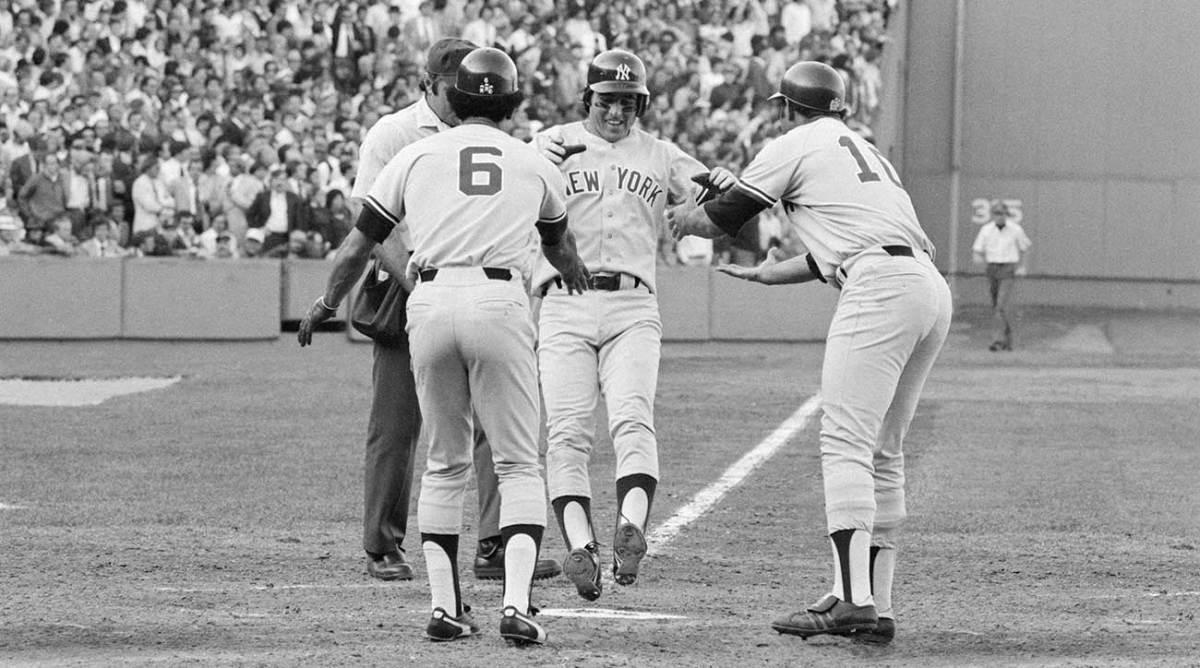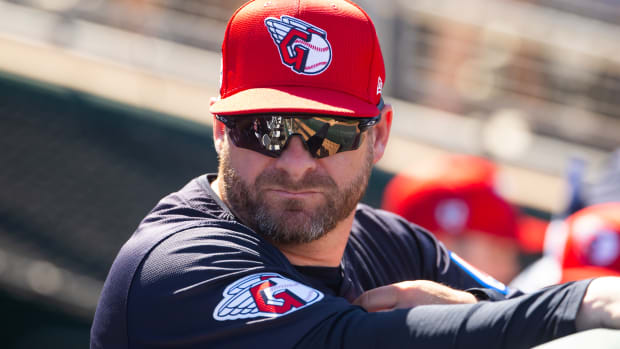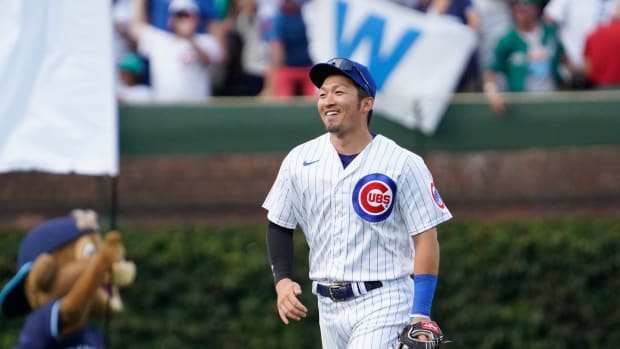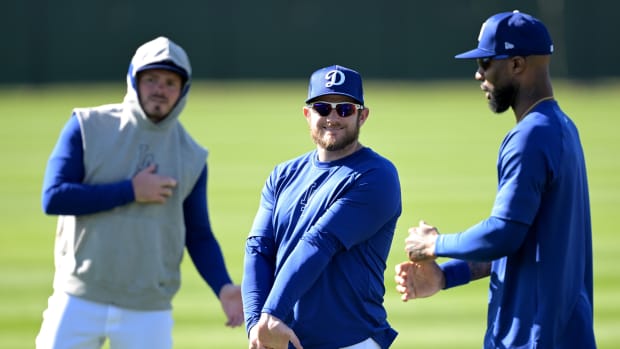Forty Years Later, Bucky Dent Is Still Soaking in His Life-Changing Home Run
This week, SI will release 14 Back, Jon Hock’s stirring documentary about the Yankees’ furious comeback from that deficit to the Red Sox in the standings late in the summer of 1978.
Ten years ago, for Sports Illustrated’s annual Where Are They Now? issue, senior writer Ben Reiter traveled to Florida to catch up with the unlikely hero who stuck the decisive blow to complete that scramble, and instantly transformed into Red Sox Nation’s lasting nemesis.
Here, we revisit that story, and at bottom update it on the 40th anniversary of the moment in which a small, unassuming middle infielder became something else entirely.
***
Swearing is prohibited at Bucky Dent's Baseball School in Delray Beach, Fla., so even the Red Sox fans among its sweet-swinging student body are technically forbidden from uttering the makeshift middle name that the school's co-owner earned 30 years ago this October. But school rules weren't the only reason the language stayed clean among the nine boys who surrounded Dent on a recent Tuesday afternoon. Though each was dressed in head-to-toe Sox gear, most didn't seem particularly familiar with the story of Bucky (Effin') Dent.
"When did Bucky Dent die?" asked one of the eight-to-10-year-olds who lounged on the outfield grass beneath pulsing clouds of gnats that had emerged after a thundershower.
"He hasn't died," said Dent, 56. "You're talking to him." (Many kids, Dent later observed, seem to think a person must be deceased to have something named for them.)
"Did you play with Babe Ruth?" asked another camper.
"No," said Dent. "He was a little before my time. But I was the shortstop in a great infield—Chambliss at first, Randolph at second, Nettles at third, Munson behind the plate." The campers appeared nonplussed.
Order your copy of SI's Red Sox-Yankees commemorative issue now!
"How many home runs did you hit?" asked another, a Yankees fan who said he was forced on this day to wear his Little League team's Red Sox uniform because his mom had his New York stuff in the wash.
"I hit 40," said Dent.
"In a season?"
"No. I wasn't really a home run hitter."
Of course, Dent, as the more senior members of Red Sox Nation still impolitely remind him whenever he crosses their paths, was a home run hitter when it mattered most: On Oct. 2, 1978, the Red Sox, who hadn't won the World Series since 1918, faced the Yankees in a one-game playoff at Fenway Park to decide the American League East title. That season the Sox, behind such stars as Dennis Eckersley, Carlton Fisk, Jim Rice and Luis Tiant, had built a 14-game lead in the division by July 19. Then it started unraveling, and the Yankees—assisted by a devastating four-game sweep at Fenway in early September—came back to tie at season's end.
Still, in the playoff game, Sox hopes were high in the top of the seventh. Behind a masterly performance by starter Mike Torrez, Boston held a 2–0 lead. The Yankees got two men on base, and with two out their scuffling shortstop was due up. Dent had been hitting .140 with no homers over his last 20 games. What was he going to do?
Dent, who'd borrowed one of teammate Mickey Rivers's bats in a desperate effort to break his slump, fouled a 1-and-1 pitch from Torrez off his left leg, in which he had a blood clot that had hampered him all year. As Dent received treatment near the on-deck circle, Rivers, who was up next, noticed something. "Hey, homey," Rivers said to Dent. "You have the wrong bat. That one's cracked." A batboy brought Dent the proper lumber, and he used it to lift Torrez's next pitch in the direction of Fenway's Green Monster. "I didn't know whether it was going to go out or not," says Dent, "until I was rounding first base and saw the umpire signaling home run." The Yankees went on to win 5–4 and ultimately beat the Dodgers in a six-game World Series in which Dent hit .417 and was named MVP. In Boston the Curse of the Bambino would live on for another 26 seasons.
***
Sometimes—though not too often—Dent wonders what the intervening 30 years would have been like if he had popped out in that seventh-inning at-bat at Fenway Park. "It's a game of moments," he says. "You look back and go, If I hadn't done that..."
Had he popped out, Dent would still have been a three-time All-Star and the shortstop on the 1977 world champion Yankees. But he likely wouldn't have become a celebrity. He would not have been invited to play a running back in a 1979 TV movie called Dallas Cowboys Cheerleaders. (A commenter on imdb.com notes that Dent is "excruciating every time he opens his mouth.") He certainly wouldn't be scheduled to appear at 40 events in the New York City area this year.
But had he popped out, much would have turned out the same. Most likely, Dent would still have gone into coaching after he retired in 1984. He began the '85 season managing the Yankees' Class A Fort Lauderdale affiliate and continued coaching through last July, when he was let go as the Cincinnati Reds' bench coach after manager Jerry Narron was fired. His one stint as a big league manager came in 1989, when he succeeded Dallas Green in midseason with the Yankees. But Dent's tenure, which coincided with the breakdown of Don Mattingly's back, lasted just 89 games. (He went 36–53.) "Back then George [Steinbrenner] wasn't very patient," he says. "I played for five managers in the six seasons I was in New York, and you knew that you were going to get fired when you worked there." Dent harbors no ill will toward the organization that made him a legend, and he's appeared at Yankee Stadium's Old Timers Day.
Dent is also sure he'd still be running his baseball school. He and Larry Hoskin, a former Cubs minor leaguer, first worked together at an instructional camp in the winter of 1974, after Dent's rookie season with the White Sox, and the two started their own school a few years later. But it's doubtful that without Dent's enduring fame their school would draw 3,000 students a year, including future major leaguers Hal Morris, Jarrod Saltalamacchia and Jamie Moyer. (Yes, Dent and Hoskin have been at it that long.) And it's certain that the school's most prominent feature wouldn't be a replica of the Green Monster.
Dent and Hoskin built the wall in 1988 to commemorate the 10th anniversary of Dent's homer. It cost more than $80,000 to construct and has 8,800 concrete blocks and pilings that extend 30 feet down into the loamy Florida soil so it can withstand hurricane winds. The wall is 235 feet wide, which matches the original, but only 35 feet high, two feet shorter than Fenway's. Those 24 inches would have required additional rebar to bring the wall to code and would have cost an extra $18,000. Says Dent, "It's close enough."
During his coaching days Dent would work only winter sessions at his camp. This is the first summer he's at the school full time, except for trips up to New York for appearances, some of which he does with his close friend Torrez. (The two were teammates on the '77 Yankees.) In the mornings at the camp, Dent tutors young infielders on the proper technique when fielding ground balls and turning double plays, often in the shadow of the camp's Green Monster—and of its scoreboard, which is painted to appear just as it did just after he hit the shot that shocked New England.
"Aww, man!" exclaimed one of the nine Red Sox lovers, looking up at the wall. "Why does the scoreboard say the Yankees are winning?" Dent grinned. Though some of his students are too young to know it, it's painted that way because it captures the very moment when, three decades ago, Bucky Dent became Bucky Dent.
2018 Update
Some things don’t change, even in ten years. The Curse of the Bambino is definitively dead: the Red Sox added their third World Series since 2004, and are currently on pace to shatter their record for single-season wins. And yet, wherever Bucky Dent goes, he is still reminded of his central role he once played in prolonging Boston’s misery on that long ago day in October.
“Hey, Bucky Effin’ Dent!” Red Sox fans will call to him. “You broke my heart!”
Yankees fans greet him differently. “You made my whole life,” they’ll say.
“People stop me and tell me where they were when I hit the homer, what they were doing, how it was the greatest game they ever saw,” says Dent, 66. “To be a part of history, to be a part of a game like that, it’s something you dream of.”
Even if the game and the emotions it wrought are forever crystallized, life isn’t. Six or seven years ago, Dent and Hoskin left their baseball school, and took Dent’s name with them. They had sold the school some years before, although they had stayed on to run it, but eventually they experienced philosophical differences with the new ownership, which wanted to professionalize it and expand its offerings to sports other than baseball. “They wanted to try to make it like an IMG Academy,” Dent says. He has watched other former campers turn into big leaguers, like the Orioles’ Danny Valencia, but he doesn’t teach baseball anymore. “We did it for 37 years,” he says. “And we were successful.”
Dent has also suffered through tragedy since that humid summer day in 2008. His wife, Marianne, passed away. “Three years ago,” he says. “She had a brain tumor.” He prefers not to say anything more about it.
At 66, Dent considers himself semi-retired. He travels from his home in Lake Worth, Fla., to New York once or twice a month during the season to tell stories and shake hands in the suites of Yankee Stadium, and continues to make regular appearances with the man who helped make him famous: Mike Torrez.
Torrez was never as tortured about his moment of Red Sox infamy as was, say, Bill Buckner, and the two have shared a running joke for decade.
“Hey Mikey,” Dent will say. “That bat Mickey gave me? It was corked.”
“I knew it!” Torrez will shout.
“Mike just happened to be the pitcher, and I happened to be the hitter,” Dent says. “He was shutting us out two to nothing. He was pitching a great game. He just happened to throw one pitch in the wrong spot. And that changed everything.”
Dent hasn’t returned to the site of his old school, which is now called ELEV8 Baseball, in several years. If he were to go back, he’d see that its replica Green Monster—two feet lower than the original—still stands, that kids still love to try to clear it, and that the scoreboard still reads as he left it. Just this summer, it got a fresh coat of paint.






































